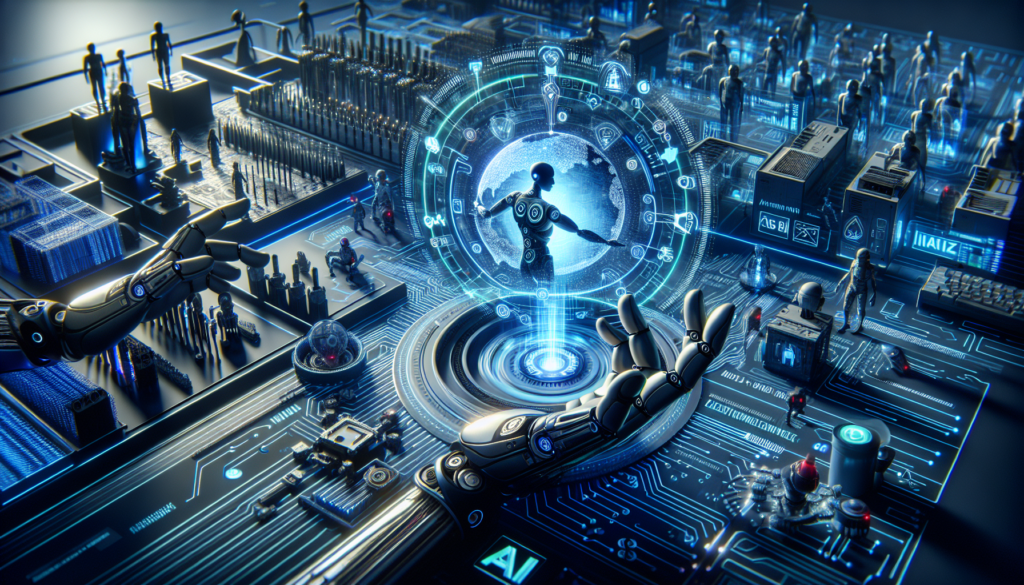Introduction
The rapid advancement of artificial intelligence technology is revolutionizing various industries, and the field of electronic components and electrical engineering is no exception. AI is increasingly being integrated into electronic devices and systems, improving their performance, efficiency, and overall functionality. This article explores the impact of artificial intelligence on the future of electronic components and electrical engineering in Europe and the USA.
The Role of Artificial Intelligence in Electronic Components
Artificial intelligence plays a crucial role in enhancing the capabilities of electronic components. It enables these components to make real-time decisions, process vast amounts of data, and adapt to changing conditions. One example is the use of AI in microprocessors, which are essential components of electronic devices.
AI-powered microprocessors have advanced machine learning capabilities that enable them to learn from past experiences and improve their performance over time. This leads to more efficient and intelligent operation of electronic devices. AI also helps microprocessors optimize power consumption, resulting in longer battery life for portable devices.
Furthermore, AI algorithms can be integrated into sensors, enabling them to collect and interpret data more effectively. For example, AI-powered sensors can accurately detect and analyze environmental conditions, such as temperature, humidity, and air quality. This information can then be used to optimize energy consumption in buildings or improve the performance of industrial processes.
Impact of Artificial Intelligence on Electrical Engineering
The integration of artificial intelligence into electrical engineering has far-reaching implications. It enables engineers to design more efficient and intelligent systems, leading to significant advancements in various industries.
Smart Grids
One notable application of AI in electrical engineering is the development of smart grids. These intelligent power distribution networks use AI algorithms to optimize energy generation, transmission, and consumption. With the help of AI, smart grids can balance the supply and demand of electricity in real-time, leading to increased energy efficiency and reduced energy wastage.
AI-powered sensors and analytics are also used in smart grids to detect and predict faults, enabling proactive maintenance and quicker response to failures. By integrating AI into the electrical grid, utilities can improve the reliability, resilience, and overall performance of their power systems.
Renewable Energy
Artificial intelligence is also playing a crucial role in advancing renewable energy technologies. AI algorithms can optimize the operation of solar and wind power systems, maximizing energy generation while minimizing cost and environmental impact.
For example, AI can analyze weather forecasts and historical data to predict solar and wind availability, allowing renewable energy systems to adjust their operation accordingly. This optimization improves the reliability of renewable energy sources, making them more viable and competitive with traditional energy sources.
Electrical Vehicle Charging
With the increasing popularity of electric vehicles (EVs), AI is becoming crucial in the development of efficient charging infrastructure. AI algorithms can optimize the charging process by considering factors such as battery health, electric grid conditions, and consumer preferences.
AI-powered charging systems can intelligently manage the flow of electricity to balance the charging needs of EVs with the overall demand on the grid. This ensures efficient charging without overloading the electrical infrastructure. Additionally, AI can optimize charging schedules to take advantage of low-demand periods, reducing the strain on the grid during peak hours.
AI Impact in Europe and the USA
Europe and the USA are at the forefront of AI development, with both regions investing significantly in research, development, and deployment of AI technologies.
In Europe, countries such as the United Kingdom, Germany, and France have established national AI strategies to promote the growth and adoption of AI across various sectors. These strategies focus on fostering collaboration between academia, industry, and government, as well as providing funding and support for AI research and innovation.
In the USA, companies like Google, Facebook, and Microsoft are leading the way in AI research and development. The US government has also recognized the strategic importance of AI and has launched initiatives to advance AI technologies and applications. Additionally, leading academic institutions like MIT and Stanford University are conducting cutting-edge AI research.
Both Europe and the USA have significant expertise in electronic components and electrical engineering. The integration of AI in these fields will further enhance their capabilities and drive innovation, leading to the development of more advanced and intelligent electronic systems.
Conclusion
Artificial intelligence is set to have a profound impact on the future of electronic components and electrical engineering in Europe and the USA. AI is already being integrated into various electronic devices and systems, enabling them to make smarter decisions, optimize power consumption, and improve overall performance. The role of AI in electrical engineering is equally significant, with applications in smart grids, renewable energy, and electric vehicle charging. Europe and the USA are at the forefront of AI development, and their expertise in electronic components and electrical engineering positions them well to leverage the opportunities that AI presents. As AI continues to evolve and mature, it will undoubtedly revolutionize the electronic components and electrical engineering markets, shaping the future of these industries for years to come.
Sources:
1) https://en.wikipedia.org/wiki/Artificial_intelligence
2) https://en.wikipedia.org/wiki/Microprocessor
3) https://en.wikipedia.org/wiki/Smart_grid
4) https://en.wikipedia.org/wiki/Renewable_energy
